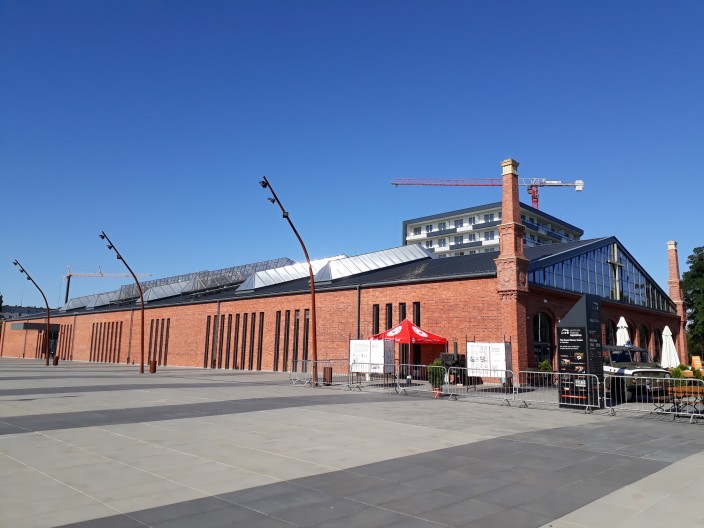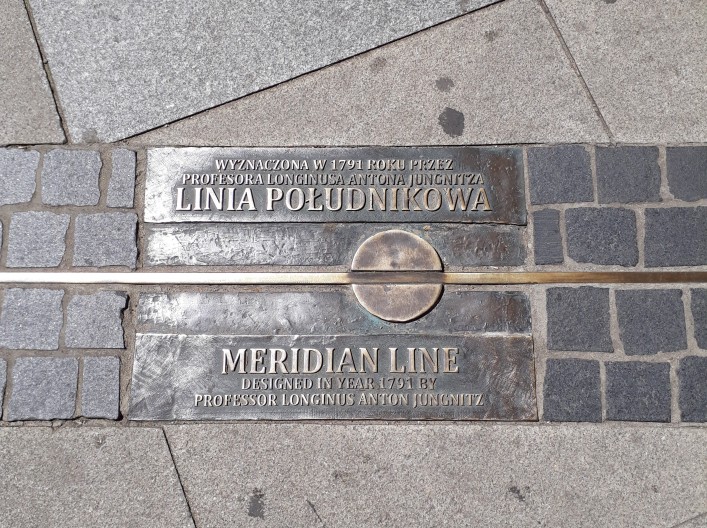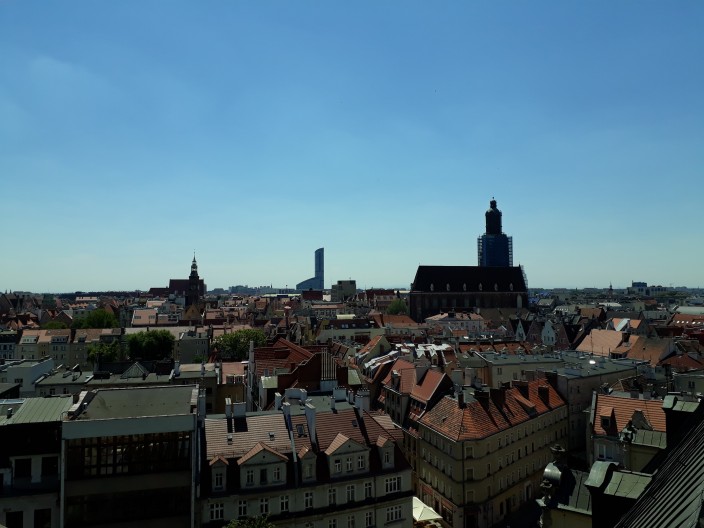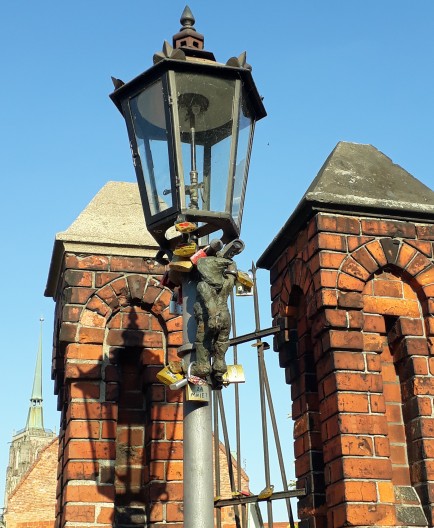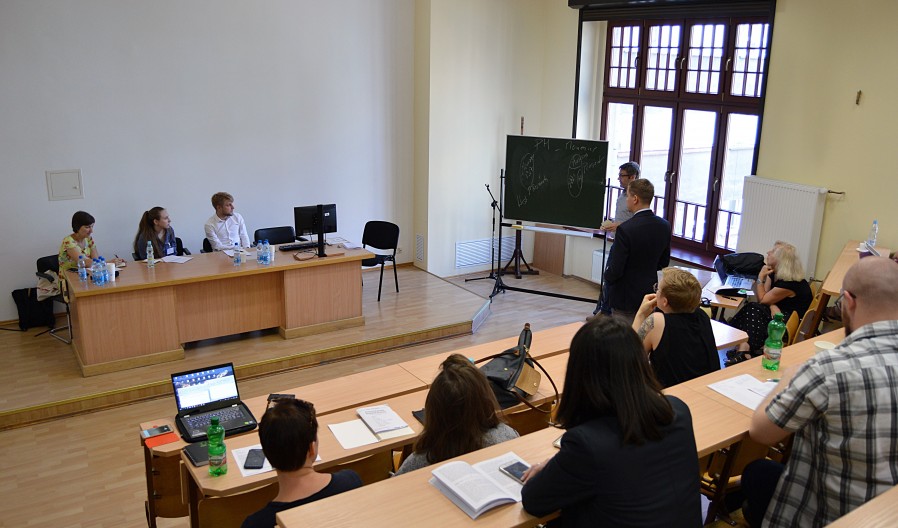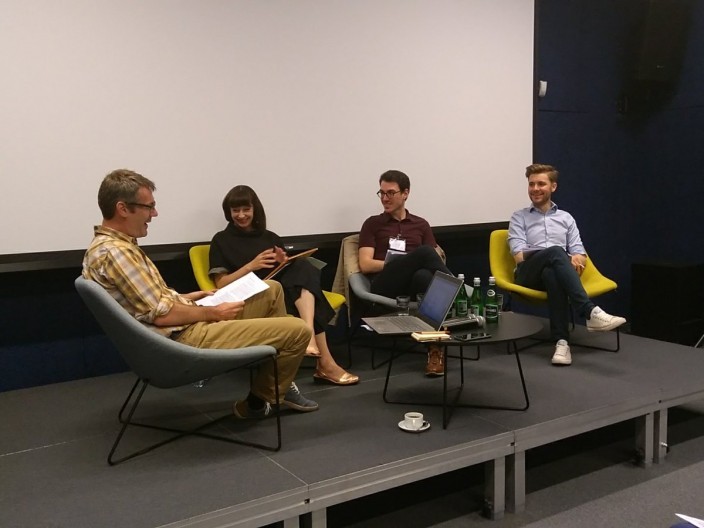Thanks to the summer school, I had the opportunity to visit and learn more about a city that I previously had not on my list of potential travel destinations. I did not know how many surprises Wroclaw would await, with its dwarfs scattered throughout the city; with the presence of the Prussian past; with its fake meridian line commemorating a professor of the University of Wroclaw who calculated it (and was wrong). In 2012, Wroclaw hosted the European football championship; in 2016 it was European Capital of Culture.
The University of Wroclaw, which offers since 2014 a public history degree, was thus a good place to host the public history summer school. During the four days, I met very committed researchers from all over Europe (and some countries beyond). I hoped to learn more about public history and research related to and carried out in countries that I don‘t know well (and I was not disappointed). In addition to panels in which researchers presented their papers, the summer school also included a round table (to which I will come back shortly), a discussion and two keynote lectures. Dr Thomas Cauvin (Colorado State University) dedicated his lecture to internationalizing public history1 and presented the activities of the International Federation for Public History (IFPH). Dr Jane Winters (University of London) dedicated her lecture to digital (public) history with a selection of related projects. The discussion round on the last day was dedicated to the House of European History in Brussels and its narrative, with the participation of Dr Chantal Kesteloot (CEGESOMA, Brussels; Jean Monnet Network for Applied European Contemporary History) and Dr Pawel Ukielski (Warsaw Rising Museum; Polish Academy of Sciences). The programme also included a visit of the Zajezdnia History Centre, an interactive museum dedicated to the history of Poland and, more specifically, of Wroclaw.
- 1.
For more on this topic, see also: Cauvin, Thomas, The Rise of Public History: An International Perspective, in:
Historia Crítica
68 (April 2018),
https://doi.org/10.7440/histcrit68.2018.01
.
When I was offered the opportunity to participate in the round table on “Why Public History?”1, moderated by Thomas Cauvin, with the participation of Dr Malgorzata Rymsza-Pawlowska (American University, Washington DC) and Wojciech Bednarski (University of Wroclaw), I was very much excited, but also very nervous. I have never studied public history and do not necessarily see myself as public historian2, despite having my own blog and being in favour of open access and making knowledge accessible to wider audiences. I have had the impression that I would need to do something more (oral history? Working with communities? Working in a museum? Creating an exhibition?) to see myself as a public historian. I have not considered my own dissertation project to be public history-related (and still think this would not be quite right and not fair to other historians actually doing a public history project). When I started with my PhD at the University of Luxembourg, I was barely aware of the existence of this field, though I had heard of public history before. This has changed, thanks to committed colleagues and professors. Besides a course on digital public history at the University of Luxembourg that I attended3, the summer school was the first opportunity for me to deepen my knowledge and my thoughts about the field.
- 1.
I would like to thank the organisers of the summer school very much for giving me this opportunity!
- 2.
In his lecture, Thomas Cauvin explained that many do not call themselves public historians, as we would then need to ask when a historian is a public historian and when not. He prefers speaking of historians doing public history.
- 3. The course was organized by Richard Legay and Anita Lucchesi from the C2DH and intended to Bachelor students. It helped me very much in learning more about (digital) public history. And of course, having two of my colleagues as teachers and finding myself attending a Bachelor course made me feel quite young again.
As I found out during my stay in Wroclaw, I was not the only one confronted with uncertainties. Others expressed them too, because they were not sure how their topic was related to public history, or because they did not see themselves as public historians (or historians doing public history). According to an often quoted definition that appeared in the 1990s, public history can be defined as
“history for the public, about the public and by the public.”
To which we might also add 'with the public'. Public history covers a broad range of activities, practices and methodologies. The variety of topics presented at the summer school illustrates this, as they ranged from museums and visitor research over food culture to video games and movies. Public history does not have a clear and universally accepted definition and even the expression might vary according to national contexts. It has been translated in countries such as France (histoire publique), Brazil (história pública) and Poland (historia w przestrzeni publicznej - history in the public space). In Italy, however, the English expression has been kept. At some point I was wondering how public history could be translated into Luxembourgish: ëffentlech Geschicht as a literal translation sounds rather unusual to me as a native speaker (though I could get used to it). For Germany, there seem to be three uses: öffentliche Geschichte (literal translation), angewandte Geschichte (applied history) and public history.
From (self-)reflexive approach to working with the public
The summer school highlighted the opportunities of public history, but also the challenges it needs to tackle in times of nationalism, of fake news, of the politicised use of history. Preparing some notes for the round table and its topics, I had to reflect on public history in societies, in universities and on an international level. While thinking on that, I imagined public history as being done on two levels. On a meta-level, it reflects on the use of history and on the role of historians in past and today’s societies. As such, public history is a reflexive and self-reflexive practice: deconstructing (master) narratives, understanding commemorations and monuments, analysing the role of history museums and the way they convey the past. Many of the presentations were about that (memories of people and specific events and their representation, monuments, narratives in museums, etc.). The debate on the House of European History (HEH) went in a similar direction. It made me think of two questions: who owns history and for whom is the HEH? I have not visited the HEH myself yet and cannot say much about what is shown. But every museum has to make choices and, in the best case, is also transparent about the choices it makes. The report by the Platform of European Memory and Conscience and of which Pawel Ukielski was the editor criticises the HEH and its narrative line for a lack of diversity, for an “ideological Hegelian or neo-Marxist” bias, for not focusing enough on Christianity and on liberalism, for putting nations in a negative view. But by doing that, is the report not itself conveying a specific narrative that addresses a specific kind of public?
On a more practical level, public history is about working with the public and involving it in the interpretation process, when organizing projects and events (public conferences, (virtual) exhibitions, crowdsourcing, podcasts etc.). Public history provides a space to voices that would be ignored when working with traditional (written) sources. These personal stories might challenge traditional narratives and interpretations of the past that only focus on successes - and history is not only about successes, as the meridian line in Wroclaw fittingly illustrates. It is also on this practical level that Michael Frisch’s concept of shared authority is much discussed. Historians work with non-historians to create knowledge and share the interpretation process. The discussion during the round table on public history elicited a rather provocative but important question: does society need historians? And how can we convince the society that it needs us? In my humble opinion, history as a discipline helps us to understand and deconstruct the past, even if it comprises tensions (between facts and interpretations). History helps in understanding the other (the neighbour, the migrant, the Muslim, etc.), it builds bridges and, as Anita Lucchesi highlighted in her blogpost, it “enables empathy”. Public history is not only about sharing knowledge and reflecting on how this can be shared (especially in the digital age), but it is also about empowerment. As Stella Molina wrote in her blogpost on the IFPH blog, “history is a serious civic engagement”.
While writing the present blogpost and with the impressions I gained during the summer school, I am now less sure about the two-level-distinction I imagined. It is not enough to reflect on commemorations and monuments when we do not share this with the public. Public history, as was explained during the summer school, is about making an impact on society. Maybe we can distinguish between a ‘deep’ or ‘core’ public history, characterized by actively working with the public, and a ‘peripheral’ public history, about sharing knowledge (produced either entirely by academics or together with non-historians). But even this distinction might turn out to be flawed.
Doing history in society
Academics do not hold the monopoly on history. History is part of society. And everyone is her or his own storyteller. In this respect, universities should not be closed institutions, accessible to selected people. Universities are part of society. As such, they play an important role in training historians and mediating knowledge. As public history covers a large variety of practices, the kind of skills that public historians need would be as various: conducting interviews, creating a webpage, organising an exhibition, etc. Maybe some skills cannot be taught at universities and involve a lot of learning by doing and practice. Nevertheless, public history training in universities contributes to raise awareness, to think more about whom we address, to create new links between historians and the public. It also contributes to gain a more critical approach towards projects (especially in the digital age) and to experiment new ways of storytelling, as has been stressed by Richard Legay.
Public history results in a stronger and more fruitful cooperation between academics, cultural institutions and communities.1 Such collaborations are probably the best way to convince people that universities and historians have a legitimate place in society. But again, this needs a lot of empathy and trust. Gaining the trust of communities can be challenging. This raises the question not only of access to communities (language, culture, etc.), but also of ethics: how should historians behave? Public history forces historians, who might not be used to confront the public with their research, to be asked uncomfortable questions, to be subject to emotional reactions, to leave the safe space of academia. Of course, we also need to be honest to ourselves and to society. We make mistakes and do not hold the key to universal knowledge. As was deplored several times during the summer school, historians are expected to have all the answers. But we don’t. We can be wrong and should admit our mistakes.2 It should not be considered as a failure or a sign of weakness to admit and correct them.
Breaking with institutionalised practices
Of course, it is useful and necessary to reflect on historians’ role in society, but public history also needs to tackle one important challenge within academia: it needs to break with institutionalized practices of doing history. Writing an academic book with footnotes is still considered to be more prestigious than talking on the radio or writing blogposts. Even presenting research in different ways, such as on a webpage or in the format of an e-book (as I had in mind for my own PhD thesis) might lack recognition from academia. Public history has the potential to change this and international public history can help in this process by improving the visibility of the field and creating a stronger lobby.
Participating in the summer school and in the round table was for me an enriching experience. Public history has many passionate debates and opportunities to offer. I could enlarge my own horizon by meeting researchers from other countries. At the same time, the uncertainties that were voiced show how uncertain the boundaries or definition of public history can be.
Maybe there is something like an ‘accidental public history’ – doing public history without having planned to do it, or without being consciously doing it. When a historian talks about his research in the media without consciously pursuing public history – is she/he doing accidental public history?
- 1. Though the University of Luxembourg does not offer a public history degree, many researchers are very much engaged in activities that can be ascribed to public history: working on (virtual) exhibitions, doing oral history, writing articles in newspapers, talking on the radio and on TV, etc. The question remains how much this work is recognised in academia, and whether it might some day be as much valued as writing an academic book.
- 2. As I found out only much later, I did mistakes in my master thesis. For me, it was important to somehow share this, which I did on my blog, under a section I call “Errata”. I’m constantly learning something new, and this also means going back to what I have written and considering it with a new perspective or new knowledge I acquired.



